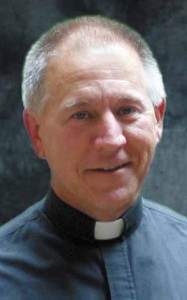By Fr. Bud Grant

This year St. Ambrose University is hosting the “Sustainability Project.” In addition to more than 20 lectures, exhibits and interactive events, the Sustainability Project will feature Native American essayist Winona LaDuke, activist Chad Pregracke, theologian John Haught, and the founder of agro-ecosystems, Wes Jackson.
But what is “sustainability?” Environmental activist Paul Gilding uses an analogy: if one is living off the interest of an investment, one is living sustainably. If, however, one taps into the principle in order to enjoy a higher short-term standard of living, then next year’s principle is smaller and one’s consumption should shrink. The rate at which we are now exhausting the earth’s limited resources would only be sustainable if there were seven planet earths.
This “nature as resource” model is not new. In Rerum Novarum, Pope Leo XIII commented that the earth’s resources are to be preserved as a “stable and permanent possession … for use in the future” (5). In 1891, perhaps, we can be forgiven this strictly utilitarian or “wise use” ethic, but it is now recognized as a seriously limited, even fundamentally flawed perspective. With Pope John Paul II’s address at Living History Farms near Des Moines, Iowa, in 1979, on Oct. 4 — the Feast of St. Francis — a new emphasis on sustaining nature qua nature (rather than exclusively as a warehouse of goods and services) began to emerge. Now, environmental theologians are at least as concerned with the intrinsic value of nature as with its instrumental value. In fact, the notion of debating the relative merits of wise use vs. eco-centric holism is more than a bit silly (no matter how often it is still heard in public policy debates) because it is like arguing whether a person’s productivity or her overall health is more important. Sustainability means the long-term viability — the health — of whole ecosystems, not just continued access to dwindling resources.
Building on this founding principle of ecological stewardship sometimes takes interesting twists. Here’s one: Matt Ehlman specializes in Native American causes and religious philanthropy. Matt is slated to talk about his unusual take on sustainability along with Troy Johnson, who has been engaged in government-funded international development programs in Kazakstan, Indonesia, Liberia and, most recently, Pakistan. (This is blatant advertising: do come hear them: Dec. 1, 4 p.m.). Troy triggered this event by referencing a New York Times OpEd by philanthropist Peter Buffett (yep, Warren is his father) who, in essence, suggested that the rich of the world cause problems and then try to assuage their guilt by donating to causes that ameliorate the damage. He calls this “conscience laundering.” Matt’s response is to suggest that philanthropy is:
• Motivated by the donor’s intent to do genuine good for and with the recipient
• Received as a real good by the recipient, who must also be a participant.
We can apply these principles to environmental sustainability. First, we ought to be motivated by something more than resource extraction — the good of the environment ought to be an essential motive, even while noting the rather obvious fact that no one’s motives for doing good for the earth or the poor or even for our own children are purified of all self-interest. I propose this equation: if, having excluded the good of the ecosystem, and your motives are still powerful enough for you to act, then that act is ethically incomplete and possibly environmentally unethical, even if, say, your motive was to feed the poor or preserve resources for your children.
The second principle is trickier, since non-sentient nature cannot judge our actions. Yet nature does “tell” us whether our actions are healthful or detrimental. This, too, can be formulated: when an act contributes to the complexity and diversity of ecological form and function, then a good has been done. A thriving ecosystem is as explicit a statement of approbation as the self-esteem of the poor or the joy-filled smile of a child.
(Father Bud Grant is a professor of theology at St. Ambrose University in Davenport.)







